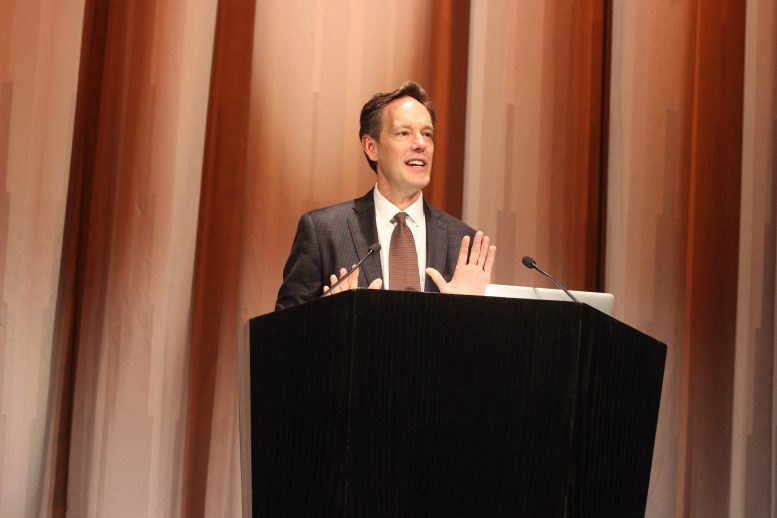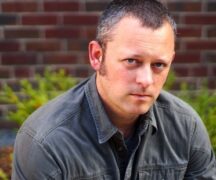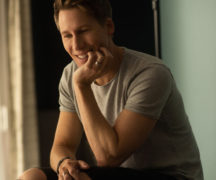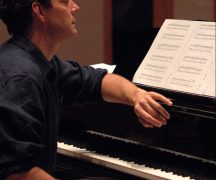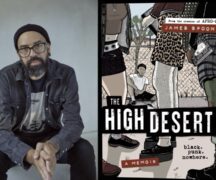By DAVID DUPONT
BG INDEPENDENT NEWS
Before the opera, before music, or the words, comes the story, said composer Jake Heggie.
“I call this ‘the well,’” he said. “If the well is deep and rich and filled with big emotions and transformation, it just might inspire wonderful words, a strong architecture and potentially beautiful, powerful music.”
Heggie have the Edwin H. Simmons Creative Minds series keynote talk, Sunday. He is on campus through Tuesday working with students.
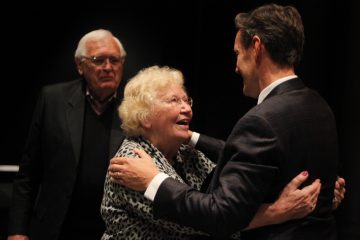
Jake Heggie greets Jan Odegaard as her husband, Lee, looks on following The Edwin N. Simmons Creative Minds Series keyote address. The Odegaards were freinds of the late Mary Cranker and helped her establish the Creative Minds Series in honor of her grandfather.
For Heggie the most attractive stories are those about the search for belonging and identity, the longing for family.
Maybe someone should write an opera about Heggie’s own life. The theme would be the redemptive power of music.
When Heggie was 10 his father committed suicide. “He suffered from crushing depression,” the opera composer said. But all Heggie and his three siblings knew is he had abandoned them. “A bomb went off in the family. There was emotional shrapnel and wreckage everywhere.”
A week later Heggie turned 11, and he started composing his first songs. He lost himself in the arts. Spending days at the movie theater, watching films, especially musicals. His first goddess was Julie Andrews.
“I felt safe and secure with music,” he said. “I spent all my paper route money on music, records, and movies. … I never felt alone though I often felt lonely.”
When his family moved from Bexley, Ohio, to southern California, Heggie, who started playing piano at 7, took his first composition lesson. When he graduated from high school, he went to study in Paris where his heroes had lived and worked.
When he returned to complete his studies at UCLA, he began studying with Johana Harris, the widow of the American composer Roy Harris. “I experienced magical teaching,” he said. Music “stopped being lofty sacred and unapproachable. It became human, visceral, real, messy, magical, and somehow more miraculous than before. Real people did all this.
“I was learning directly from the keepers of a flame … the flame that had guided me all along.”
It had brought him to a place where he was immersed the greatest in the performing arts. He was on stage turning pages for those who accompanied renowned singers. He played for the choir and for faculty members.
When he graduated, he wanted to return for graduate studies right away. “I missed school. I felt successful when I was surrounded by music and study.”
Then his right hand started to curl up and cramp when he played. He was diagnosed with focal dystonia.
“I was 28 years old and couldn’t play the piano anymore,” he said, “My musical identity was thrown into chaos.” He lost the will to compose. “I fell in a very dark space,” he said. “I didn’t like myself very much.”
Heggie was also struggling with his identity as a gay man during the height of the AIDS crisis. “There was a lot of secrecy, lies, hiding, and shame. I felt out of step with the world and like an immense failure.
“The precious, innate fire that had always felt like an indelible gift, part of my DNA, had become a painful reminder of something lost. A new quest for identity began.”
He began working in arts administration and publicity. He left southern California for San Francisco. There, at least, people had not known him as a pianist.
In San Francisco, he ended up being hired as the writer for the San Francisco Opera. In that role, he got a chance to explore the all the corners of the opera house in order to share it with the public. He met the stage hands and stars. “It was family.”
Heggie said: “It was the best apprenticeship possible for an aspiring opera composer except I didn’t know I was an aspiring opera composer.”
Using the Dorothy Taubman technique he had begun to play piano again.
So he took a chance and set some folk songs for Frederica von Stade. He played as she sang them the first time. She suggested they perform together. She became a friend and supporter.
In 1995, he won the G. Schirmer song competition.
Then the opera’s general director Lotfi Mansouri suggested at a party that Heggie try his hand at writing an opera. Heggie dismissed it as small talk. Then he was invited into the general director’s office and where Mansouri reprised his suggestion. “I think you’re a theater composer,” he told Heggie.
Heggie could go to New York and work with Terrence McNally. Maybe a comedy, something “celebratory” for the turn of the millennium.
That “comedy” turned into “Dead Man Walking.” It was well received. And Julie Andrews was in the audience. The opera continues to be performed around the world.
During the process of composing, he realized he was a theater composer. He had found his home.
Music forces people to “raise the bar,” he said.
“We’re mere mortals, but we aim for perfection,” he said.
It was his music teachers and directors who “helped me explore a horizon of possibility beyond anything I could have imagined on my own. Without them I wouldn’t be addressing you today.”
Heggie, 56, wouldn’t have written eight operas, several one-act operas, 300 or so songs as well as choral, orchestral and chamber works.
That’s why he feels so strongly about the need to support arts education.
“I believe there’s a war on the arts and we’re on the front line,” he said. People like those in the audience are warriors for the arts who have a responsibility to keep the flame alive.
“We need a powerful, strong, vital system of music education from preschool onwards,” he said. That involves more than taking kids to the opera.
Children need to make music for themselves. “It’s the physicality of art, music, and theater that engages kids. It is essential and it changes lives. It changed mine. The ripple effect is unknowable.”
What is needed are heroes. “Someone needs to save the day, so why shouldn’t it be you. I choose you to ignite the fire of possibility. … We have a lot of work to do so let’s get going.”

